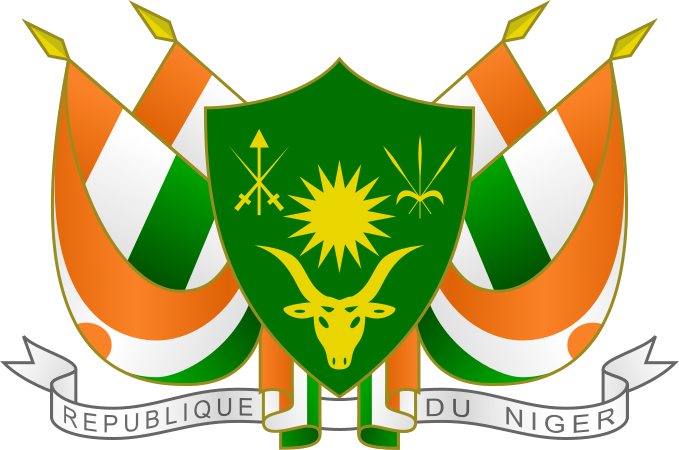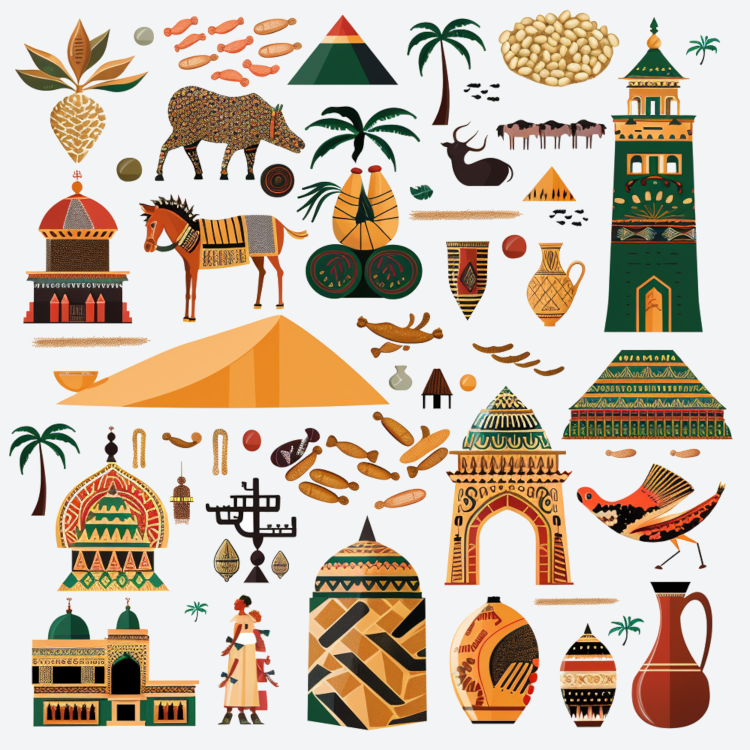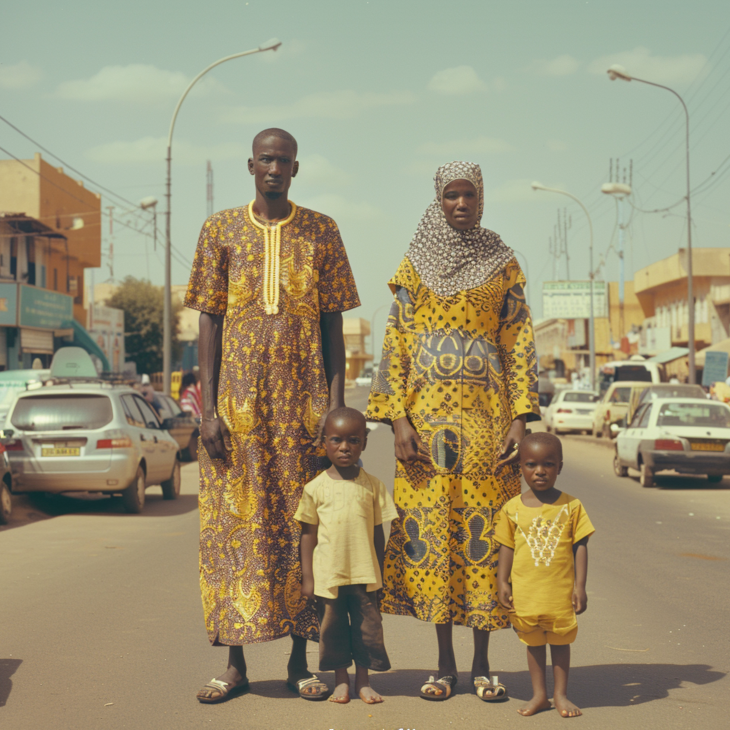About NE

Location
Niger is a landlocked country located in West Africa, bordered by Algeria and Libya to the north, Chad to the east, Nigeria and Benin to the south, Burkina Faso and Mali to the west.
Capital
The capital city of Niger is Niamey.
Population
As of the latest estimates, Niger has a population of approximately 25.9 million people.
Area
Niger covers a total land area of about 1,267,000 square kilometers (489,000 square miles), making it the largest country in West Africa by land area.
Official Language
The official language of Niger is French.
Government
Niger is a semi-presidential republic with a multi-party system. The President of Niger serves as both the head of state and the head of government. The country has a unicameral legislature known as the National Assembly.
Independence
Niger gained independence from France on August 3, 1960.
Currency
The currency of Niger is the West African CFA franc (XOF).
Economy
Niger is one of the poorest countries in the world with a predominantly agrarian economy. Agriculture, livestock rearing, and subsistence farming are the primary sources of livelihood for the majority of the population. The country also has significant mineral resources, including uranium, which is its main export.
Natural Resources
Niger is rich in mineral resources, including uranium, coal, iron ore, gold, and oil. Uranium is the country's most important mineral resource and contributes significantly to its economy.
Climate
Niger has a predominantly arid climate with hot temperatures and low rainfall. The country experiences distinct dry and rainy seasons, with the rainy season occurring from June to September.
Culture
Niger is home to a diverse array of ethnic groups, each with its own unique culture, traditions, and languages. The Hausa, Zarma-Songhai, Tuareg, Fulani, and Kanuri are among the largest ethnic groups in Niger. The country's cultural heritage is expressed through music, dance, art, storytelling, and festivals.
Religion
Islam is the predominant religion in Niger, with the majority of the population being Muslim. There are also small Christian and traditional indigenous religious communities.
Wildlife
Niger is home to diverse wildlife, including species such as elephants, giraffes, lions, cheetahs, hippos, and various bird species. The W National Park, located in the southeastern part of the country, is a UNESCO World Heritage Site known for its rich biodiversity.
Challenges
Niger faces several challenges, including poverty, food insecurity, desertification, inadequate infrastructure, and political instability. The country also grapples with periodic droughts and floods, which exacerbate food shortages and economic hardships.

National Items of Niger
Wodaabe People
The Wodaabe people, known for their elaborate cultural ceremonies and traditional attire, symbolize the rich cultural heritage and traditional customs of Niger.
Sahara Desert
The Sahara Desert covers much of Niger, symbolizing the natural beauty, vast landscapes, and the challenging environment of the country.
Niger River
The Niger River is one of the major rivers in West Africa and is vital to Niger. It symbolizes natural resources, sustenance, transportation, and the lifeblood of the country.
Millet
Millet is a staple crop in Niger, symbolizing agricultural heritage, sustenance, and traditional farming practices.
Gerewol Festival
The Gerewol Festival is a traditional celebration by the Wodaabe people, featuring elaborate dances and rituals. It symbolizes cultural heritage, social traditions, and artistic expression.
Tuareg People
The Tuareg people, a Berber ethnic group, symbolize the cultural diversity, traditional nomadic lifestyle, and historical significance of Niger.
Djinn (Genie) Stories
Djinn stories and legends are an integral part of Nigerien folklore, symbolizing the rich oral tradition, cultural heritage, and spiritual beliefs.
Traditional Hausa Architecture
Traditional Hausa architecture, characterized by intricately decorated buildings and homes, symbolizes cultural heritage, artisanal craftsmanship, and historical significance.
Agadez
Agadez is a historic city and a UNESCO World Heritage site, known for its ancient mosque and traditional architecture. It symbolizes historical heritage, cultural significance, and the crossroads of Saharan trade routes.
Peanut (Groundnut)
Peanuts are a significant agricultural product in Niger, symbolizing agricultural heritage, economic importance, and traditional farming practices.
Griot
Griots are traditional storytellers, musicians, and historians in Niger. They symbolize the oral tradition, cultural heritage, and historical preservation.
Sand Dunes of the Tenere Desert
The dunes of the Tenere Desert, part of the Sahara, symbolize the unique natural landscapes and ecological diversity of Niger.
Salt Caravans
Salt caravans, historically significant for trade, symbolize the traditional commerce, nomadic lifestyle, and cultural heritage of the Tuareg people.
Ténéré Tree
The Ténéré Tree, once considered the most isolated tree on Earth, symbolized resilience and the harsh environment of the Sahara before it was accidentally knocked down in 1973. It remains a powerful symbol in Niger's history.
Toubou People
The Toubou people, an ethnic group in Niger, symbolize cultural diversity, traditional lifestyle, and historical significance.
Morama Gourds
Morama gourds, used in traditional ceremonies and daily life, symbolize cultural heritage, traditional craftsmanship, and practical utility.
Fula Cattle
Fula cattle, raised by the Fulani people, symbolize wealth, sustenance, and the traditional pastoral lifestyle in Niger.
Kanuri Language
The Kanuri language, spoken by the Kanuri people, symbolizes linguistic heritage, cultural identity, and social cohesion.
Nigerien Traditional Music
Traditional Nigerien music, often featuring instruments like the molo and goje, symbolizes cultural heritage, artistic expression, and social traditions.
Sahelian Goat
The Sahelian goat is a common livestock in Niger, symbolizing agricultural heritage, economic importance, and traditional farming practices.

This anthem celebrates Niger's beauty, unity, and aspirations for peace and prosperity. It reflects the spirit of patriotism and resilience of the Nigerien people.
The national anthem of Niger is called "La Nigérienne" in French, which translates to "The Nigerien" in English. Here are the lyrics in French along with an English translation:
Ô mon beau pays, ô mon cher pays,
Ton soleil se lève et nous te promet
Une aurore plus radieuse,
Plus belle que d'autres pays.
Salut ô patrie ! La patrie ou la mort,
Nous vaincrons !
Que le grand Niger protège notre unité,
Que nos cœurs vibrent aux couleurs de la paix,
Tolérance et paix,
Travail et prospérité.
Salut ô patrie ! La patrie ou la mort,
Nous vaincrons !
O my beautiful country, o my dear country,
Your sun is rising and promises us
A dawn more radiant,
More beautiful than in other countries.
Hail, O homeland! Homeland or death,
We shall overcome!
May the great Niger protect our unity,
May our hearts beat to the colors of peace,
Tolerance and peace,
Work and prosperity.
Hail, O homeland! Homeland or death,
We shall overcome!


